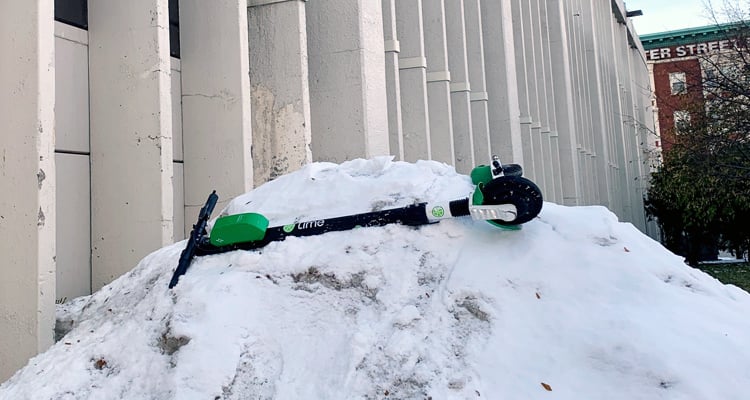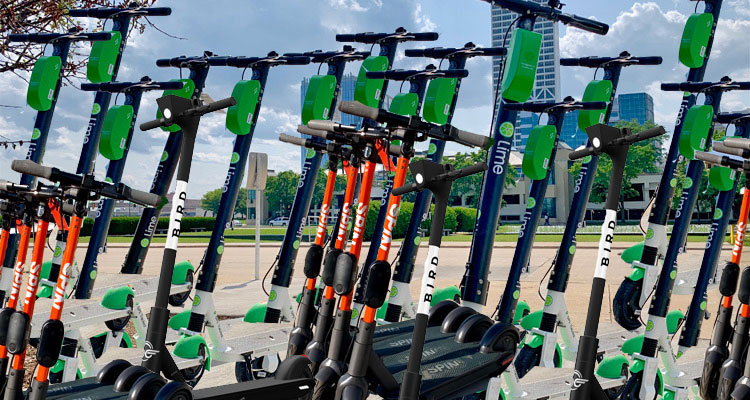Remember those scooters? Remember how Milwaukee got really, really worked up about them in 2018 and 2019? Remember how Milwaukee really, really forgot about them in 2020 (when they failed to return because of COVID-19)? Well, Milwaukee hasn’t forgotten, apparently. The city’s recently released 2019 Dockless Scooter Pilot Study calls Milwaukee’s initial brush with electric Bird, Lime, and Spin scooters a success. Not only that, it recommends a new pilot study for 2021. Mark your calendars.
“The 2019 Dockless Scooter Pilot Study proved to be a success in many ways,” the study reads. “The high ridership demonstrates latent demand for new transportation options, and 58.4% of survey respondents cited ‘more transportation options in Milwaukee’ as an important or very important benefit of dockless scooters. Smaller, electric, shared vehicles also have the potential to assist in achieving other City goals around health, equity, safer streets, and climate change.
“The COVID-19 pandemic has greatly impacted the way people move,” the study continues. “Travel patterns have been disrupted by work from home arrangements and restrictions on transit ridership. It is impossible to know what residents’ and visitors’ transportation needs will be in 2021. A second pilot study will give the City the flexibility it needs to respond to changes in transportation.”
You can read the full 2019 pilot study HERE. Its recommendations for 2021 are:
1. Reconfigure zones to encourage usage in other areas of the City
2. Increase allowable fleet size to encourage usage in other parts of the City
3. Revise fee structure to include a reduced per scooter fee and a new per trip fee
4. Require operators to conduct regular safety and educational events to promote safe riding and proper parking
5. Clarify parking requirements and eliminate the 2-hour grace period that allows operators to remedy parking violations once notified
6. Add scooter parking violations to the City’s “Click 4 Action” online and app-based service request portal
7. Work with operators to install and promote painted parking corrals throughout high demand areas
8. Require operators to include a plan for incorporating scooters that accommodate people of varying abilities
9. Require operators to maintain a severe weather policy
10. Specify the font size and location of information required on scooters
11. Establish a 24-hour idle time policy for scooters so scooters cannot remain unused in the same place for more than one day
12. Enter into an agreement with a third party data manager prior to beginning the 2021 pilot study
Mike Amsden and Kate Riordan of the Department of Public Works presented the study during a Public Works Committee meeting Wednesday afternoon. The presentation was informational only. Riordan noted that the recommendations were “not set in stone.” The new pilot study is set to begin in spring 2021.
Some highlights from the 2019 pilot study include:
• “Customers in Milwaukee took a total of 350,130 rides over the course of the 131-day Pilot Study, or an average of 2,672 rides per day.”
• “The Milwaukee Police Department (MPD) reported six motor vehicle–scooter crashes during the Pilot Study.”
• “A total of 67 crashes were reported, including 29 ‘unspecified unsafe riding’ reports, which may include incidents that were not crashes.”
• “The Mayor’s Office received feedback about the Pilot Study through emails and phone calls. The majority of comments (89.7%) were received in August. Positive and negative feedback were almost exactly evenly split, with 42.8% of the comments categorized as ‘positive’ and 41.6% as ‘negative.'”
A (mercifully) brief history of scooters in Milwaukee: Bird was the first electric scooter company to enter the market back in June 2018. Days before Summerfest, hundreds of the vehicles suddenly appeared downtown. Then all hell broke loose: Milwaukee sued Bird and kinda-sorta banned the things. The city settled the lawsuit soon after, and Bird voluntarily removed its scooters and vowed to work with city officials to bring them back. That led to the creation of a pilot program in July 2019, designed to study demand, safety, and the future of scooters in Milwaukee. Lime was the first company to show up for the program, followed by Spin and Bird. Lime and Spin were initially allowed fleets of 500 scooters each. Bird was allowed 350. The pilot program ended in November 2019.
The scooters’ return in 2020 was put on hold due to COVID-19. The city “had to focus on essential services, which meant, make sure the water keeps running, make sure the garbage gets picked up every day,” the Department of Public Works told the Milwaukee Journal Sentinel in July.


